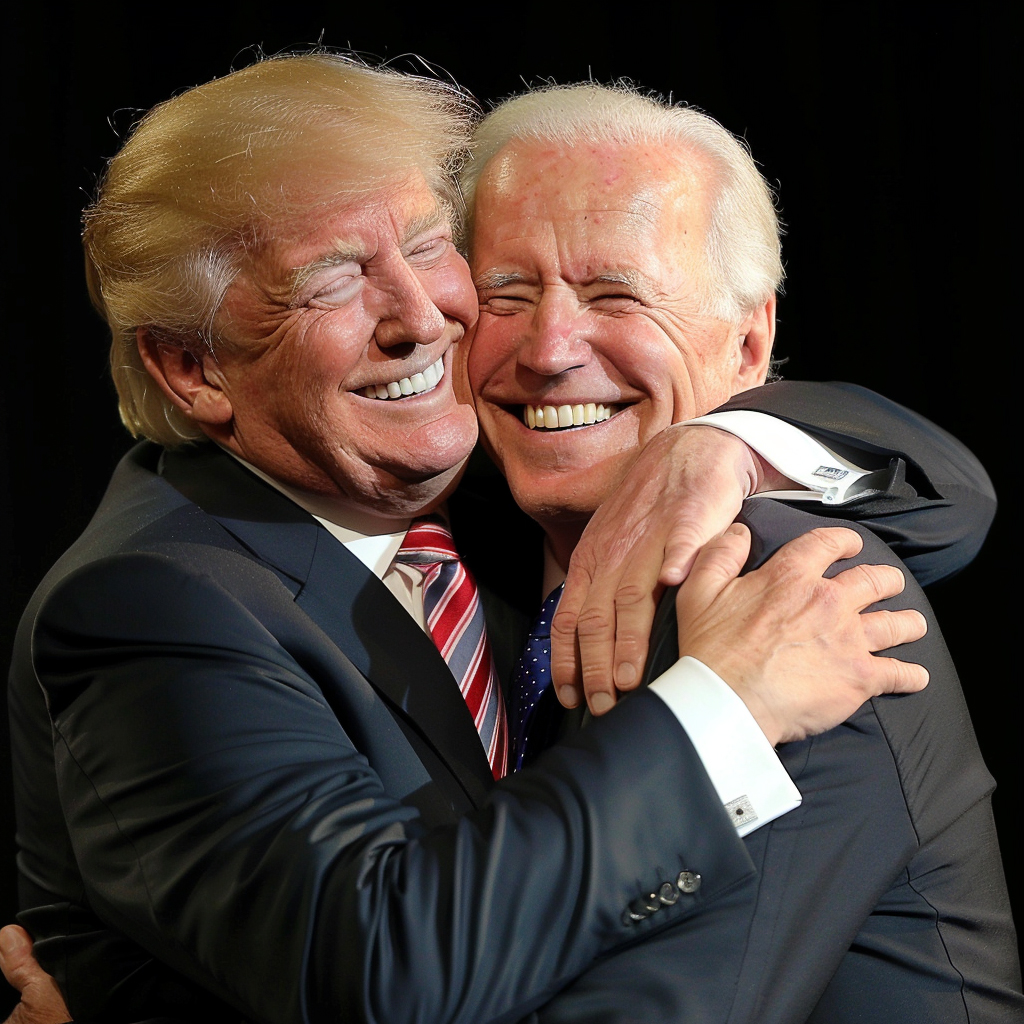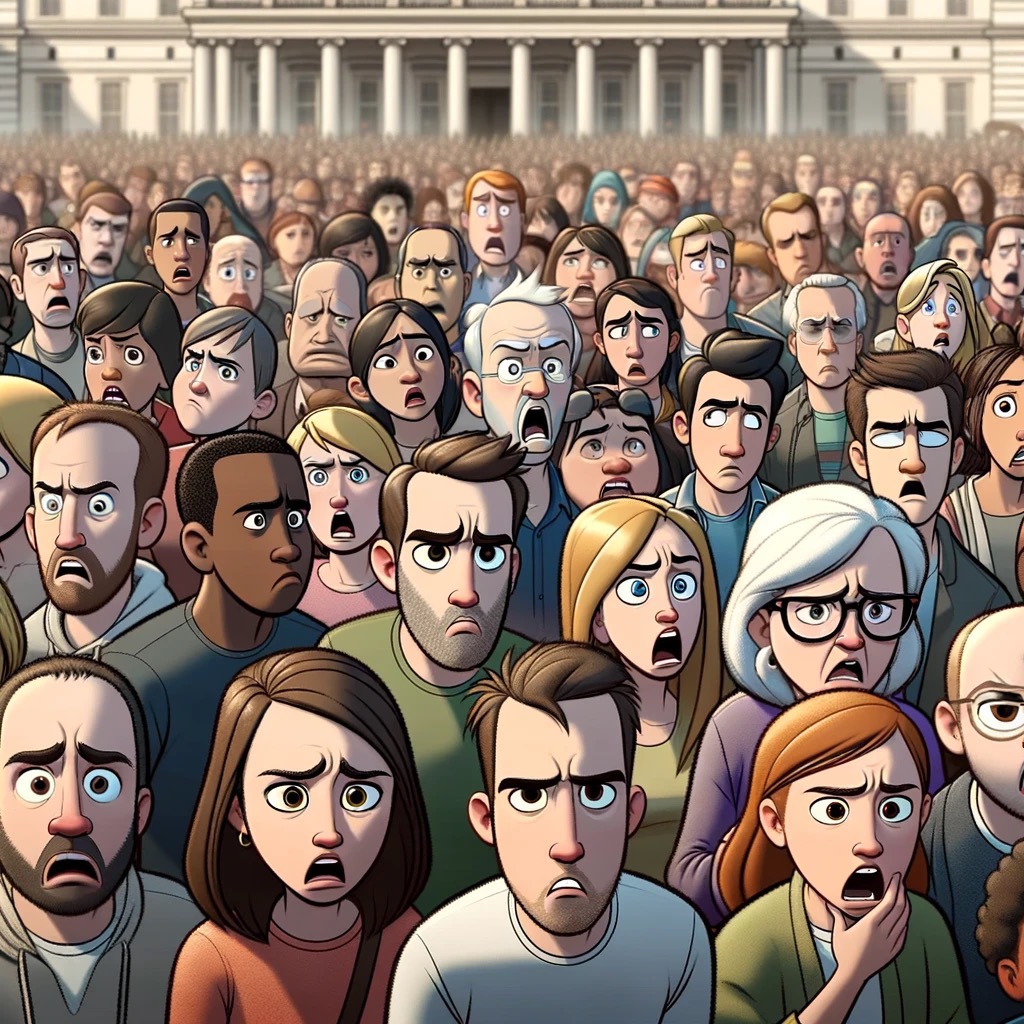No matter which side you choose, if you identify as a political partisan, you will always be unhappy, anxious, and dissatisfied.

The American People are deeply divided, more so than at any time since the Civil War. There are many reasons for these divisions, none of which matter to political partisanship’s emotional effect on everyone who participates.
Most people have some opinion on the social problems we face as Americans and what role the government has in solving these problems. It’s one thing to form an opinion on a political issue, but it’s something else entirely to choose to identify with a political party.
Whenever we see social injustice, we naturally desire to see that injustice corrected. This desire informs many of our opinions on important political and social issues. Sometimes, the best solution to a political issue is advocated by Democrats, sometimes by Republicans. No political party has the best solution to every political issue.
Why Do People Become Political Partisans?
Political partisanship refers to the strong allegiance to one’s political party, often leading to unwavering support for party policies and candidates, regardless of the broader context or evidence that may suggest alternative viewpoints.
This allegiance distorts how individuals perceive political events, policy discussions, and the actions of political figures, fostering a divided political landscape where compromise and cross-party collaboration are challenging, sometimes even considered a betrayal.

People become identified with one political party or another through various processes, including:
Family and Socialization: Many individuals inherit their political affiliations from their families, adopting the political identities of their parents or close family members during their formative years. This early socialization can have a lasting impact on political identity.
Educational Influences: The education system, including schools and universities, can significantly shape political beliefs and affiliations. Exposure to different political theories, discussions, and the political climate within educational institutions can influence one’s political alignment.
Social Groups and Networks: Peer groups, social networks, and community organizations can influence political partisanship. The political leanings of one’s social circle can impact individual political beliefs and party identification, generally reinforcing existing tendencies.
Media Consumption: The media, including news outlets, social media platforms, and other forms of communication, significantly influences political partisanship. Many people tend to consume media aligning with their political ideologies to reinforce those beliefs and encourage identification with their political party.

Personal Values and Beliefs: Individual values, beliefs, and personal experiences shape political partisanship. People often affiliate with political parties that they perceive best represent their interests, values, and vision for society. Perception is reality, and even if a party fails to actually benefit the individual in any way, as long as they maintain the illusion, they will maintain their partisan identification.
Political Environment and Events: Significant political events, shifts in the political landscape, and the overall political climate can influence party identification. However, once partisan affiliation is formed, changes in leadership or policy rarely change people’s identification.
Why Does Partisanship Lead to Unhappiness?
All political partisans are unhappy. All of them.

Some are angry and hateful; some are rude and condescending; some dream that partisans of the other side will change their minds, and some futilely hope the division will end.
All political partisans are frustrated and disappointed to various degrees depending on how in or out of power their cadre is at any given time. They are completely subject to the worldly winds and forces far outside of their control.
On a national level, we have four major nodes of power: the Presidency or Executive Branch, the Senate, the House of Representatives, and the Supreme Court. Rarely does any party have majority control of all four power nodes. And even when one of them does, the minority party still has procedural levers, most notably the Senate Filibuster, to foil the will of the party in power.
In short, even when one party has all the power, they don’t always get what they want; they must endure legislative failures and the failings of their mistaken policies.
And even if the partisan’s affiliated party had complete control at the national level, they may not control State or local governments or the policies of other states, foreign allies or other world powers.
There is no satisfaction in politics.

And even if there were, it would be fleeting, lasting at most a two-year election cycle while the minority party and its associated media relentlessly lampooned the foibles and failures of the partisan’s favored party.
And if, by some miracle, the partisan’s party enjoyed power for more than two years, the internal forces would eventually shatter the internal coalitions as the various factions of the ruling party demanded more and more.
Partisanship has failure built into its success.
Further, maintaining power requires continually turning out partisan voters, which generally requires maintaining a state of anger and fear, which are not peaceful and happy states of mind.

Exacerbating Unhappiness and Dissatisfaction
The more polarized and partisan the political environment becomes, the more important it becomes for party leaders to motivate partisans to get to the polls and vote.
Apathy or complacency leads to lost elections.
The only sure method to turn out partisans is to make them angry and fearful. If people believe their lifestyle and freedoms are in jeopardy, they will turn out to vote as an act of self-protection.
If you consume any partisan media, you immediately recognize this reality. Partisan media always features the evil members of the other party doing nefarious things while the good guys of their party are victims of the slings and arrows.
Partisans are discouraged from feeling compassion for the plight of anyone who doesn’t share their point of view. The evil-doers on the other side deserve the anger and hatred directed toward them.
Anger is a disturbing mental state.

Anger is a painful state of mind, a source of tremendous suffering.
Anger makes people tense and uncomfortable.
Anger makes it difficult to sleep, and even when sleep comes, it isn’t restful or refreshing.
Anger makes it difficult to enjoy activities, other than violence and cruelty, inflicting pain on others for petty revenge.
Angry people often lose their freedom of choice, driven to action without concern for consequence.
Angry people live in a state of perpetual victimhood, blaming others for their misfortunes and even the anger itself.
Anger destroys relationships.
Anger makes most people wish to retaliate against those perceived to be the cause of harm. The desire to retaliate often causes people to expose themselves to unnecessary personal danger. Actual retaliation harms others and fails to calm the angry mind.
Anger leads to personal conflict, generally causing damage to both parties. Even the victor in violent conflict is often bloodied and weakened.
Angry people have no friends. They exploit acquaintances and servants for specific needs, but every interaction becomes transactional, devoid of connection or closeness.
Anger transforms people into enemies.
Angry people make enemies of anyone who fails to submit willingly to their demands.
Angry people portray others as evil for resisting their will.
Angry people must always be vigilant against potential attacks from rivals, as enemies of their own creation always surround them.
Angry people die alone, forsaken and forgotten, shunned by all who previously cared for them.
Overcoming Partisan Differences
There is no victory for a partisan. The enemy will never be vanquished. Like a Phoenix rising from the ashes, even the most defeated and downtrodden partisan enemy will return with new issues, leaders, and propaganda.
The partisan war is futility defined. The only way to win that war is not to engage in it.
But how do you do that? It is quite simple to explain but nearly impossible for hardcore partisans to accomplish.
First, stop partaking in partisan media. Don’t turn on your favorite news channel. Don’t read your favorite biased websites. Don’t share your friends and family’s partisan posts.
Second, stop making enemies of those who have different opinions from your own. You are not right, and they are not wrong, no matter how certain you are. Your opinions are not facts, and neither are theirs.
Third, list the other side’s good traits and policy successes. And yes, the other side has good qualities, and they have implemented good policies.
Thus far, I have not called out either side in our current political divide. A partisan from either side could read this post without feeling it biased. I have no interest in advocating one side or the other. I only wish to point out the foolishness and inevitable unhappiness that partisan identification inevitably leads to.
I don’t wish to favor one side or the other, so bear that in mind when reading the next section.
Joe Biden and Donald Trump’s Good Traits
Partisans will view everything their candidate has ever accomplished as positive and everything accomplished by the other candidate as negative.
I don’t want to provide a list of traits partisans will disagree on. Below is a list of positive traits all but the most hardcore partisans can acknowledge.

- Both men were widely respected and accomplished in their respective fields prior to becoming candidates.
- Both men inspired their supporters and earned the nomination of their respective political parties to represent them as their candidate for President of the United States.
- Both men convinced enough voters in enough states to secure a victory in the Electoral College and become lawfully elected President of the United States.
- Both men worked to advance the agenda of their supporters while in office in an effort to earn reelection.
Both men possess unique talents that helped them in their careers and in their candidacy to become president.
Donald Trump’s Unique Talents
- Donald Trump has a deep understanding of human nature, group dynamics, and how to influence public opinion. He used these skills to gain political support for his real estate development projects and his candidacy for the presidency.
- Donald Trump has tremendous energy and drive for personal success. He always put forth the effort necessary to obtain approval for his real estate projects and campaigned tirelessly for the presidency.
- Donald Trump amassed a large personal fortune with extensive real estate holdings.
- Donald Trump gained fame through his real estate ventures, authoring best-selling books, and starring in a popular TV series prior to running for public office. He is an expert at self-promotion.
Due to the extreme polarization of our politics, nearly anything else one may want to say about his personal or professional life is subject to debate and interpretation through a partisan lens.
Joe Biden’s Unique Talents
- Joe Biden served as a US Senator for 36 years, Vice President for eight years, and President for four years (so far). By serving in government for 48 years, he demonstrated the skills to please his constituents and secure reelection. He has never lost a bid for public office, and he received the most votes ever for president in his 2020 election victory.
- Joe Biden showed tremendous emotional strength as he has endured many difficult losses in his personal life, including his first wife and daughter in a car accident and his son to cancer. He has maintained strong personal relationships and is, by all accounts, an honorable family man.
- Joe Biden is widely perceived as a stabilizing force in American politics, often working with the opposition party to craft bi-partisan legislation.
Again, due to the extreme polarization, little else can be said that most could agree with.
Partisan Differences Is the Source of Unhappiness
Why is it important to find agreeable positive characteristics of the other side? All partisan politics is sustained by focusing on our differences. By focusing on our differences and disagreements, we remain fractured as a country and angry at those who hold views different from our own.
Partisans work diligently to get others to “see the light.” But this is a fool’s errand. No partisan has ever convinced an opposing partisan of their truth. It’s a war for hearts and minds that both sides always lose. And playing the game makes them and others unhappy.
By all means, you should advocate for positions on issues you are passionate about. This isn’t a call for political apathy. But in your zeal and advocacy, don’t succumb to the partisan tendency to demonize your opponents, characterize them negatively, and identify with those who share your passion for that issue. It’s a road to the dark side and endless suffering.

